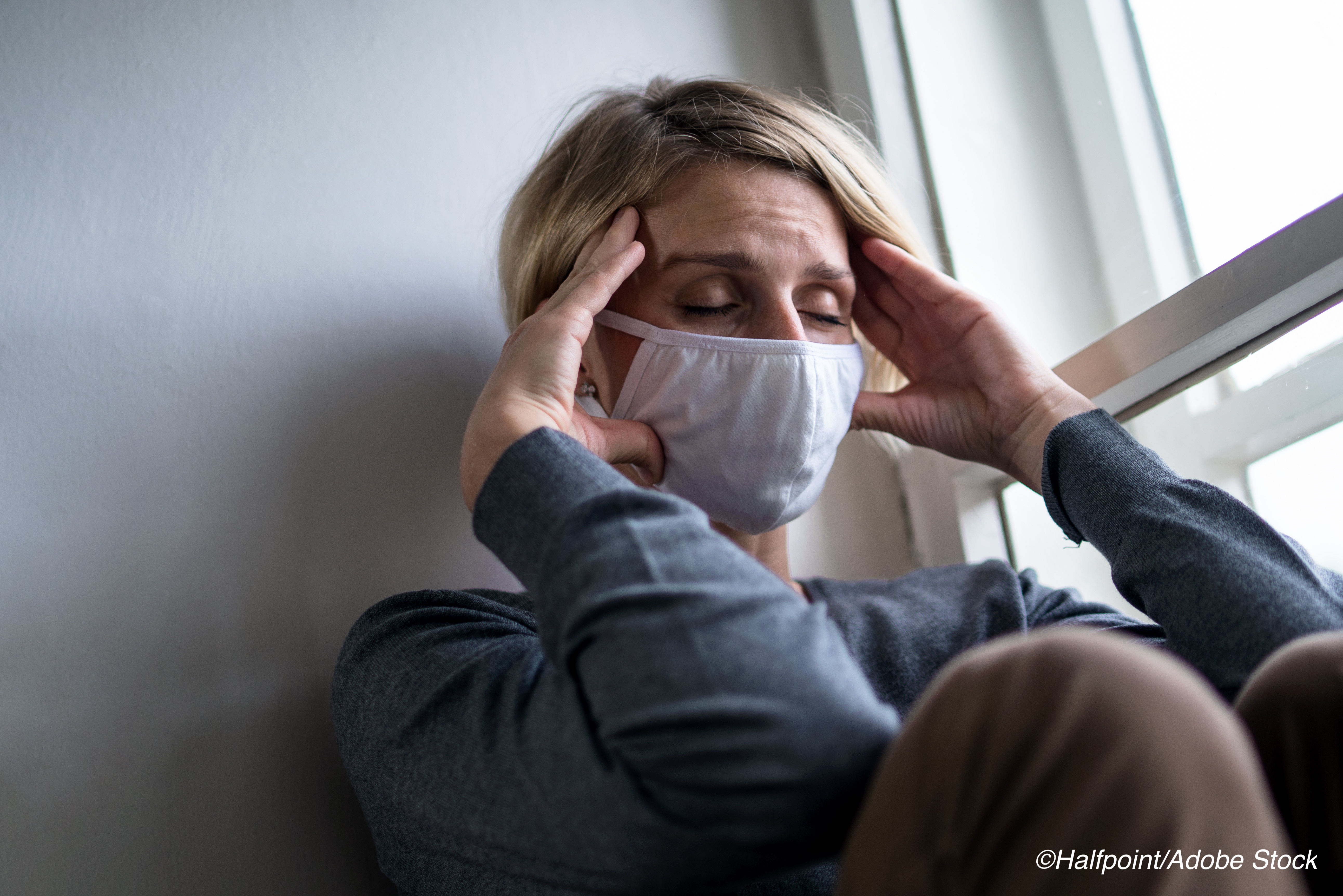 Anxiety, depression, and other mental health issues related to Covid-19 remained common and well above prepandemic levels among adults in the United States last fall, according to newly published survey results from the Covid-19 Outbreak Public Evaluation (COPE) Initiative.
Anxiety, depression, and other mental health issues related to Covid-19 remained common and well above prepandemic levels among adults in the United States last fall, according to newly published survey results from the Covid-19 Outbreak Public Evaluation (COPE) Initiative.
Surveys conducted from April through June of 2020 showed a three-fold increased prevalence of anxiety and depression symptoms, compared to pre-pandemic levels, with close to 41% of 5,470 adults surveyed in June reporting adverse mental or behavioral health symptoms.
In a related survey conducted in September, 33% of adult respondents reported anxiety or depression symptoms and close to 30% reported experiencing Covid-19-related trauma and stress-related symptoms.
Around one in seven (15.1%) respondents reported increased substance use and around one in eight (11.9%) reported having serious thoughts of suicide in the previous month.
In all, 43.1% of respondents reported at least one mental health symptom.
The survey findings, published online Feb. 19 ahead of print in JAMA Network Open, highlight the ongoing mental health issues related to the Covid-19 pandemic, wrote researchers Mark É. Czeisler, AB, of Monash University, Clayton, Australia, and colleagues.
“In a later phase of the Covid-19 pandemic, the prevalence of adverse mental health symptoms among U.S. adults remained elevated compared with prepandemic estimates,” the researchers wrote. “This finding contradicts the notion that adverse mental health symptoms were transient, self-limiting responses.”
In earlier nationally representative surveys of U.S. adults conducted before the Covid-19 pandemic and in the early weeks of the pandemic (March 31-April 13), the prevalence of depression symptoms increased from 8.5% before Covid-19 to 27.8% during Covid-19.
In those surveys, lower income groups were at greater risk of depression symptoms, and having less than $5,000 in household savings was associated with 1.5-fold increased odds of depression symptoms, or 50% greater risk.
The newly published COPE Initiative survey included U.S. adults who completed a 139-item internet-based questionnaire between Aug. 28 and Sept. 6, 2020.
The researchers used demographic quota sampling and survey weighting to make the sample representative of the U.S. population by age, sex, and race/ethnicity.
Study participants reported symptoms of anxiety and depression, Covid-19−related trauma and stressor-related disorders, starting or increasing substance use to cope with pandemic-related stress, or having seriously considered suicide within 30 days.
Multivariable Poisson regressions with robust standard errors were used to estimate adjusted prevalence ratios (aPRs) and 95% CIs, and the researchers ran separate models for collinear factors, including disability status, insomnia symptoms, prior psychiatric diagnosis (anxiety, depression, post-traumatic stress disorder, or a substance use disorder), and age-excluded employment status.
Continuity corrected McNemar testing was used to assess longitudinal differences in adverse mental health symptom prevalence among respondents who completed surveys in June 2020 and September 2020.
A total of 5,285 of 11,953 (44.2%) contacted adults completed the September 2020 surveys, and 5,186 (98.1%) met secondary screening criteria and were analyzed. In all, 1,155 (22.3%) were re-contacted after April 2020; 1,605 (30.9%) were re-contacted after June 2020; 2,426 (46.8%) were first-time respondents.
Among the main survey finding:
- Overall, 1,710 (33%) reported anxiety or depression symptoms, 1,536 (29.6%) reported Covid-19–related trauma-and stressor-related disorder symptoms, and 781 (15.1%) reported increased substance use.
- A total of 618 (11.9%) reported having seriously considered trying to kill themselves in August.
- Adverse mental or behavioral health symptoms were more prevalent among adults younger than 65 years versus adults aged 65 years or older (e.g., 18-24 years, aPR, 3.56 [95% CI, 3.04-4.18]), among multigenerational caregivers versus non-caregivers (aPR, 1.93 [95% CI, 1.78-2.08]), and among respondents with prior psychiatric diagnoses versus those with no prior diagnoses (aPR, 1.98 [95% CI, 1.83-2.15]).
- The prevalence of adverse mental or behavioral health symptoms was also higher among respondents with disabilities or insomnia symptoms versus those without, caregivers for adults versus non-caregivers, essential workers and unemployed respondents versus nonessential workers, and respondents who were lesbian, gay, or bisexual versus heterosexual.
Among prior survey respondents who were contacted after June 2020, prevalence of adverse mental health symptoms did not differ significantly between June 2020 and September 2020.
“Despite increased Covid-19–related morbidity and mortality risk, adverse mental health symptoms among older adults remained less prevalent,” wrote Czeisler and colleagues. “Although quota sampling and survey weighting were used, internet-based survey samples are limited and may not fully represent the 2020 U.S. population. Nonetheless, evidence of sustained adverse mental health symptoms among more than 5,000 community-dwelling U.S. adults highlights the need to promote preventive behaviors, expand mental health care access, and integrate medical and behavioral health services to mitigate the mental health effects of Covid-19.”
- Anxiety, depression, and other mental health issues related to Covid-19 remained common and well above prepandemic levels among adults in the United States in surveys conducted last fall.
- The latest survey results from the Covid-19 Outbreak Public Evaluation (COPE) Initiative highlight the ongoing mental health issues related to the Covid-19 pandemic.
Salynn Boyles, Contributing Writer, BreakingMED™
Funding for this study was provided by the CDC, BNY Mellon and WHOOP.
Lead researcher Mark Czeisler reported receiving grants from the Australian-American Fulbright Commission during the conduct of the study and receiving personal fees from Vanda Pharmaceuticals outside the submittedwork. Dr Czeisler reported receiving grants to support The COVID-19 Outbreak Public Evaluation (COPE) Initiative and grants from Brigham andWomen’s Physician’s Organization during the conduct of the study; being a paid consultant to or speaker for Ganésco, Institute of Digital Media and Child Development, Klarman Family Foundation, M. Davis and Co, Physician’s Seal, Samsung Group, State ofWashington Board of Pilotage Commissioners, Tencent Holdings, Teva Pharma Australia, and Vanda Pharmaceuticals, in which Dr. Czeisler holds an equity interest; receiving travel support from Aspen Brain Institute, Bloomage International Investment Group, UK Biotechnology and Biological Sciences Research Council, Bouley Botanical.
Cat ID: 144
Topic ID: 87,144,730,933,190,926,192,927,144,146,52,55,151,928,925,934


